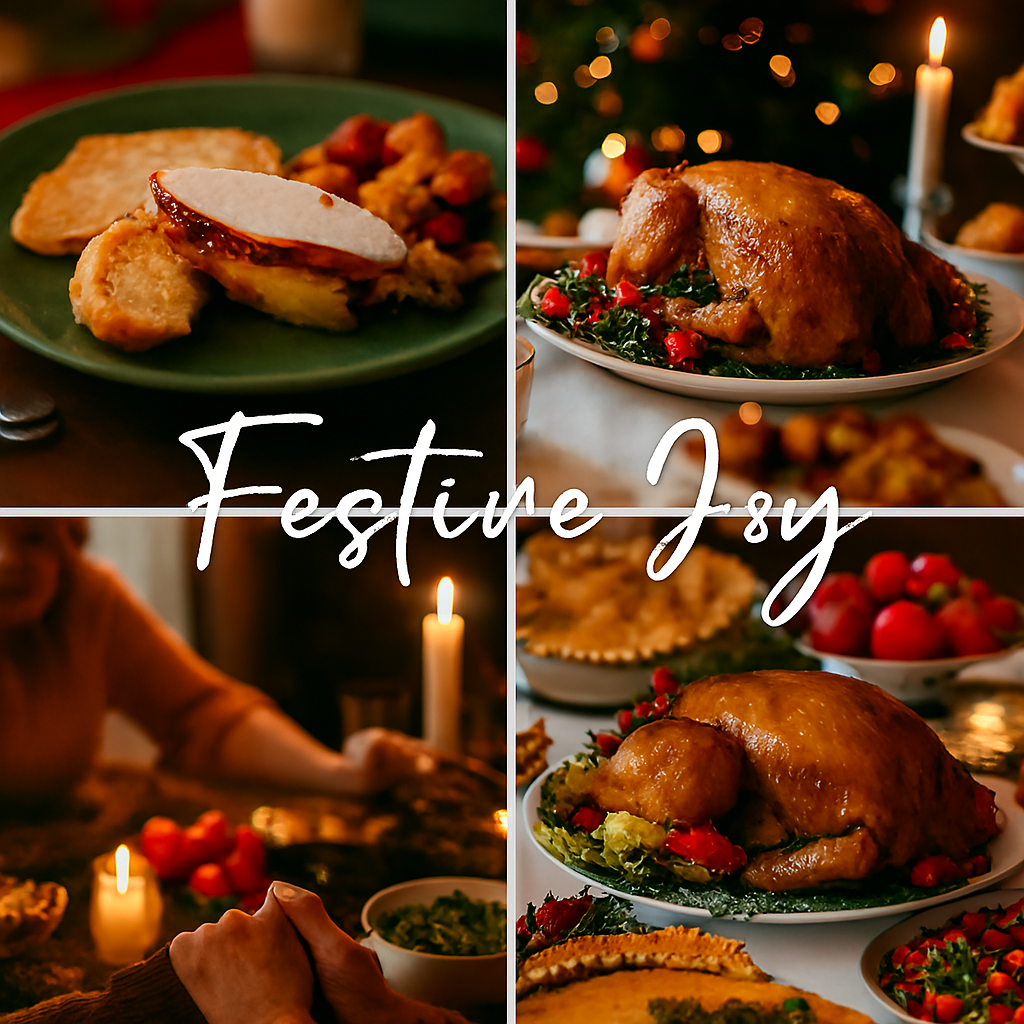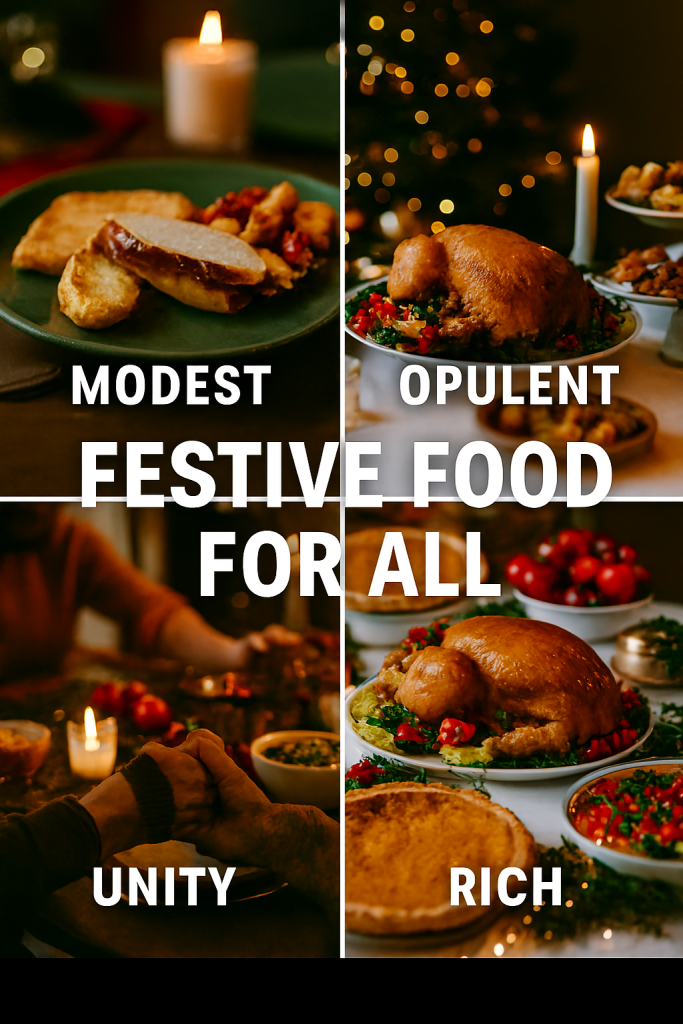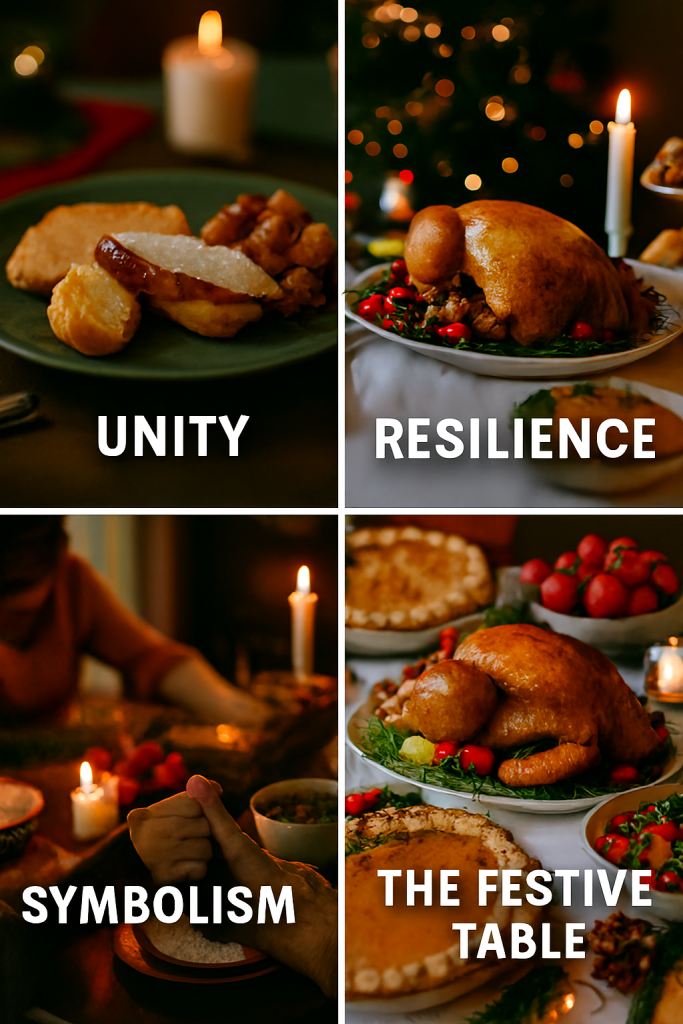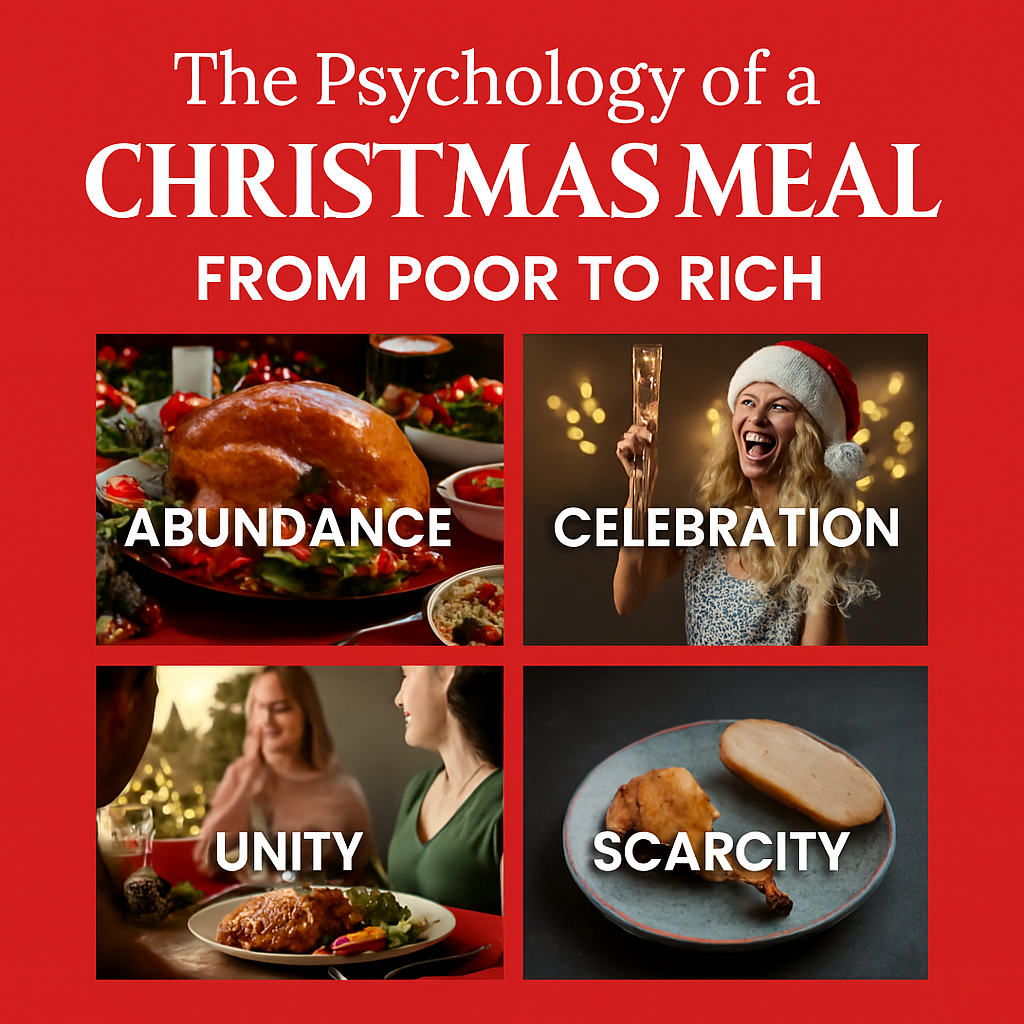The Yummy Psychology Of A Christmas Meal From Poor To Rich
The Psychology Of A Christmas Meal From Poor To Rich – Understanding The Emotional Layers Of Festive Food
A Christmas meal is more than a plate of food – it is a mirror of social class, cultural identity, and psychological meaning. Across history, the festive table has reflected wealth, scarcity, generosity, and aspiration. Families with limited means often use simple dishes to symbolize togetherness, while affluent households may emphasize abundance and variety. The psychology of this meal lies in how individuals interpret food as a marker of belonging, memory, and hope. Rich or poor, the Christmas table becomes a stage where emotions, traditions, and expectations converge. Exploring this journey from modest meals to lavish feasts reveals how food shapes identity and emotional well-being.
The Psychology Of A Christmas Meal
The Symbolism Of Scarcity – Emotional Meaning In Simple Meals
For poorer families, Christmas meals often carry symbolic weight rather than material abundance. A single roasted chicken or shared stew can represent unity and resilience. The psychology here is rooted in gratitude, where scarcity heightens appreciation for even small portions. Children in such households often remember the warmth of family more than the food itself. Scarcity also fosters creativity, as cooks adapt inexpensive ingredients into festive dishes. The emotional impact is profound, showing that joy can emerge from modest circumstances.
Comparative Table – Poor Versus Rich Christmas Meals
| Aspect | Poor Household Meal | Rich Household Meal |
|---|---|---|
| Main Dish | Roast chicken or stew | Roast turkey, ham, or multiple meats |
| Side Dishes | Potatoes, bread, seasonal vegetables | Exotic vegetables, seafood, gourmet sides |
| Dessert | Simple pudding or cake | Multi-course desserts, imported chocolates |
| Symbolism | Gratitude and resilience | Status and abundance |
| Emotional Impact | Togetherness despite limits | Celebration of wealth and tradition |
The Role Of Memory – How Childhood Meals Shape Identity
Christmas meals are deeply tied to memory, shaping how individuals perceive family and tradition. Poorer households often emphasize shared rituals, such as baking together or decorating simple dishes. These memories become anchors of identity, reminding adults of resilience and love. Wealthier households may recall elaborate spreads, yet the emotional core often lies in the anticipation rather than the food itself. Memory psychology shows that emotional intensity, not material value, defines recollection.
Key Points – Memory And Festive Food
- Childhood meals create lasting emotional associations.
- Scarcity can intensify gratitude and bonding.
- Wealth may emphasize spectacle but not always deeper meaning.
- Rituals such as baking or serving together strengthen identity.
- Emotional recall often outweighs material abundance.
The Social Status Of Food – Meals As A Marker Of Class
Food at Christmas often signals social status, shaping perceptions of wealth and belonging. Poor households may feel pressure to imitate richer traditions, while affluent families showcase abundance. The psychology here involves comparison, where meals become symbols of aspiration or pride. Status-driven meals can create both joy and anxiety, depending on expectations. The contrast between scarcity and abundance highlights how food reflects social hierarchy.
Table – Social Status Reflected In Christmas Meals
| Indicator | Poor Household | Rich Household |
|---|---|---|
| Presentation | Simple, practical | Decorative, elaborate |
| Guest Perception | Humble hospitality | Prestige and luxury |
| Emotional Tone | Gratitude and modesty | Pride and display |
| Psychological Effect | Resilience and bonding | Validation of success |
| Cultural Message | Survival and unity | Celebration of prosperity |
The Ritual Of Sharing – Psychological Impact Of Communal Eating
Sharing food is central to the psychology of Christmas meals. Poor households emphasize equal portions, reinforcing fairness and unity. Rich households may highlight generosity through abundance, offering guests multiple choices. The act of sharing creates emotional bonds, reducing feelings of isolation. Psychologists note that communal eating enhances trust and empathy. Whether modest or lavish, the ritual of sharing transforms food into a symbol of belonging.
Points – Sharing And Emotional Connection
- Equal portions reinforce fairness in poor households.
- Abundance symbolizes generosity in wealthy homes.
- Communal eating strengthens empathy and trust.
- Sharing reduces isolation and enhances belonging.
- Food becomes a medium of emotional exchange.

The Influence Of Tradition – Continuity Across Generations
Tradition plays a powerful role in shaping Christmas meals. Poor families may preserve recipes passed down through generations, even with limited resources. Rich families often maintain elaborate traditions, such as multi-course feasts or imported delicacies. The psychology of tradition lies in continuity, offering stability in changing times. Rituals provide comfort, reminding individuals of heritage and identity. Tradition ensures that meals carry meaning beyond nutrition.
Table – Traditional Practices In Christmas Meals
| Tradition | Poor Household | Rich Household |
|---|---|---|
| Recipes | Simple, inherited | Complex, diverse |
| Rituals | Baking together, shared prayers | Formal dining, ceremonial serving |
| Continuity | Strong emotional link | Strong cultural link |
| Adaptability | High, due to necessity | Lower, due to preservation |
| Psychological Value | Comfort and resilience | Prestige and heritage |
The Psychology Of Aspiration – Food As A Symbol Of Hope
Aspiration influences how families approach Christmas meals. Poor households may dream of richer spreads, using symbolic dishes to represent hope. Rich households may aspire to impress or try for perfection, seeking flawless presentation and variety. The psychology of aspiration reflects human desire for improvement and recognition. Food becomes a metaphor for progress, whether through survival or success. Aspiration ensures that meals carry emotional meaning beyond immediate consumption.
Points – Aspiration And Emotional Meaning
- Poor households use symbolic dishes to represent hope.
- Rich households aspire to flawless presentation.
- Food reflects human desire for progress.
- Aspiration connects meals to future dreams.
- Emotional meaning extends beyond immediate consumption.
The Impact Of Generosity – Giving Through Food
Generosity is a defining feature of Christmas meals. Poor households may share limited portions with neighbors, emphasizing kindness despite scarcity. Rich households often donate lavish spreads or host large gatherings. The psychology of generosity lies in the emotional satisfaction of giving. Food becomes a tool for expressing empathy and solidarity. Generosity transforms meals into acts of social connection.
Table – Generosity In Christmas Meals
| Aspect | Poor Household | Rich Household |
|---|---|---|
| Sharing | Limited but heartfelt | Abundant and symbolic |
| Motivation | Empathy and solidarity | Prestige and philanthropy |
| Emotional Effect | Gratitude and bonding | Validation and pride |
| Social Impact | Strengthens community | Enhances reputation |
| Psychological Value | Joy in giving | Satisfaction in display |
The Role Of Celebration – Food As A Festive Marker
Celebration is central to the psychology of Christmas meals. Poor households emphasize joy through simple rituals, such as singing or storytelling. Rich households highlight spectacle, with elaborate decorations and multi-course feasts. The psychology of celebration lies in emotional release, marking the end of hardship or achievement. Food becomes a symbol of festivity, reinforcing cultural identity. Celebration ensures that meals carry emotional resonance beyond taste.
Points – Celebration And Emotional Resonance
- Simple rituals create joy in poor households.
- Spectacle enhances festivity in rich households.
- Emotional release marks achievement or survival.
- Food symbolizes cultural identity.
- Celebration ensures meals carry resonance beyond taste.
The Influence Of Religion – Spiritual Meaning In Meals
Religion often shapes the psychology of Christmas meals. Poor households may emphasize prayers and gratitude, linking food to spiritual survival. Rich households may incorporate ceremonial rituals, reinforcing cultural heritage. The psychology of religion lies in connecting meals to higher meaning. Food becomes a symbol of divine blessing, reinforcing faith and identity. Religion ensures that meals carry spiritual resonance.
Table – Religious Influence On Christmas Meals
| Aspect | Poor Household | Rich Household |
|---|---|---|
| Prayer | Central to meal | Formal but symbolic |
| Rituals | Gratitude and survival | Heritage and ceremony |
| Emotional Effect | Faith and resilience | Prestige and continuity |
| Spiritual Value | Divine blessing | Cultural reinforcement |
| Psychological Impact | Comfort and hope | Identity and pride |
The Emotional Weight Of Simplicity – Finding Joy In Modest Dishes
Poor households often rely on simple dishes that carry deep emotional meaning. A single loaf of bread or a pot of stew can symbolize resilience and togetherness. The psychology of simplicity lies in how families transform limited resources into shared joy. Children often remember the laughter and warmth more than the food itself. Modest meals remind families that celebration is about connection rather than material abundance.
Table – Emotional Value Of Simple Versus Lavish Meals
| Aspect | Simple Meal | Lavish Meal |
|---|---|---|
| Symbolism | Resilience and gratitude | Status and abundance |
| Emotional Focus | Togetherness | Display and prestige |
| Memory Impact | Warmth and laughter | Anticipation and spectacle |
| Psychological Effect | Comfort in scarcity | Pride in prosperity |
| Cultural Message | Survival and unity | Celebration of wealth |
The Power Of Ritual – How Repetition Shapes Meaning
Rituals give Christmas meals psychological depth, whether poor or rich. Poor households may repeat simple acts such as lighting candles or sharing prayers. Rich households may emphasize formal traditions like carving the turkey or serving champagne. Ritual repetition creates emotional stability, offering comfort across generations. Psychologists note that rituals reduce anxiety and reinforce belonging. Meals become more than food – they become ceremonies of identity.
Points – Rituals And Their Psychological Impact
- Rituals reduce anxiety and create stability.
- Poor households emphasize symbolic acts.
- Rich households highlight formal traditions.
- Repetition strengthens emotional bonds.
- Meals become ceremonies of identity.
The Contrast Of Expectation – Anticipation Across Social Classes
Expectation shapes the psychology of Christmas meals. Poor households anticipate small joys, such as a sweet dessert or shared laughter. Rich households anticipate spectacle, with multiple courses and elaborate decorations. The psychology of expectation lies in how anticipation heightens emotional experience. Even modest meals can feel extraordinary when eagerly awaited. Expectation ensures that meals carry emotional weight before they are even served.
Table – Expectation In Poor And Rich Meals
| Aspect | Poor Household | Rich Household |
|---|---|---|
| Anticipation | Small joys | Spectacle and variety |
| Emotional Effect | Heightened gratitude | Heightened pride |
| Symbolism | Hope and resilience | Status and abundance |
| Memory Impact | Joy in simplicity | Joy in grandeur |
| Psychological Value | Emotional intensity | Cultural validation |
The Influence Of Community – Meals As Social Bonds
Community plays a vital role in Christmas meals. Poor households may invite neighbors to share limited portions, reinforcing solidarity. Rich households may host large gatherings, showcasing abundance and prestige. The psychology of community lies in how food strengthens social ties. Sharing meals reduces isolation and enhances belonging. Community ensures that meals carry meaning beyond the family table.
Points – Community And Social Connection
- Poor households emphasize solidarity through sharing.
- Rich households highlight prestige through hosting.
- Food strengthens social ties across classes.
- Sharing reduces isolation and enhances belonging.
- Community ensures meals carry meaning beyond family.
The Role Of Gender And Labor – Who Prepares The Meal
The preparation of Christmas meals often reflects gender roles and labor distribution. Poor households may rely on collective cooking, with everyone contributing. Rich households may emphasize formal roles, with hired staff or designated family members. The psychology of labor lies in how effort shapes emotional meaning. Meals prepared with shared labor carry deeper emotional resonance. Food becomes a symbol of sacrifice and care.
Table – Gender And Labor In Christmas Meals
| Aspect | Poor Household | Rich Household |
|---|---|---|
| Labor Distribution | Collective effort | Formal or hired roles |
| Emotional Effect | Shared sacrifice | Prestige and order |
| Symbolism | Care and resilience | Status and tradition |
| Psychological Value | Emotional resonance | Cultural validation |
| Memory Impact | Bonding through effort | Anticipation of spectacle |
The Psychology Of Taste – Flavor As Emotional Memory
Taste plays a powerful role in shaping Christmas memories. Poor households may emphasize strong flavors from simple ingredients, such as spiced stews or sweet puddings. Rich households may highlight complex flavors, with gourmet dishes and imported spices. The psychology of taste lies in how flavor triggers emotional recall. Even simple flavors can evoke powerful memories of family and tradition. Taste ensures that meals carry emotional resonance long after consumption.
Points – Taste And Emotional Recall
- Simple flavors evoke powerful memories.
- Rich flavors emphasize complexity and prestige.
- Taste triggers emotional recall across generations.
- Flavor ensures meals carry resonance beyond consumption.
- Food becomes a sensory anchor of identity.

The Impact Of Scarcity On Creativity – Innovation In Poor Meals
Scarcity often drives creativity in poor households. Families adapt inexpensive ingredients into festive dishes, transforming necessity into innovation. Rich households may emphasize variety, but poor households highlight ingenuity. The psychology of creativity lies in how scarcity fosters resourcefulness. Innovation ensures that meals carry meaning beyond material abundance. Creativity becomes a symbol of resilience and hope.
Table – Creativity In Poor Versus Rich Meals
| Aspect | Poor Household | Rich Household |
|---|---|---|
| Ingredient Use | Adaptation and substitution | Variety and abundance |
| Emotional Effect | Pride in ingenuity | Pride in display |
| Symbolism | Resilience and hope | Status and prestige |
| Psychological Value | Innovation and survival | Cultural validation |
| Memory Impact | Joy in resourcefulness | Joy in spectacle |
The Psychology Of Christmas Abundance – Emotional Impact Of Festive Excess
Abundance shapes the psychology of rich Christmas meals. Multiple courses, elaborate desserts, and decorative spreads symbolize wealth and success. The psychology of abundance lies in how excess reinforces pride and validation. Poor households may aspire to abundance, while rich households celebrate it. Abundance ensures that meals carry emotional meaning tied to status. Food becomes a symbol of prosperity and achievement.
Points – Abundance And Emotional Meaning
- Rich households emphasize excess as validation.
- Poor households aspire to abundance.
- Excess reinforces pride and success.
- Food symbolizes prosperity and achievement.
- Abundance ensures meals carry emotional meaning tied to status.
The Emotional Value Of Family Roles – Identity Through Contribution
Family roles during Christmas meals carry psychological meaning. Poor households often emphasize collective effort, where each member contributes something small but meaningful. Rich households may highlight formal roles, such as a designated carver or host. The psychology of roles lies in how contribution reinforces identity and belonging. When everyone participates, meals become symbols of unity. Roles ensure that food preparation and serving carry emotional resonance beyond taste.
Points – Family Roles And Emotional Identity
- Contribution reinforces identity and belonging.
- Poor households emphasize collective effort.
- Rich households highlight formal roles.
- Participation strengthens unity.
- Roles ensure meals carry emotional resonance beyond taste.
The Psychology Of Celebration Spaces – Setting And Atmosphere
The setting of a Christmas meal influences its psychological impact. Poor households may gather in small kitchens or living rooms, emphasizing intimacy. Rich households may host in decorated dining halls, emphasizing spectacle. The psychology of space lies in how atmosphere shapes emotional meaning. Intimate spaces highlight closeness, while grand spaces highlight prestige. Setting ensures that meals carry emotional resonance beyond the food itself.
Table – Atmosphere In Poor And Rich Settings
| Aspect | Poor Household | Rich Household |
|---|---|---|
| Space | Small, intimate | Large, decorated |
| Atmosphere | Warmth and closeness | Prestige and spectacle |
| Emotional Effect | Comfort and unity | Pride and validation |
| Symbolism | Survival and resilience | Status and tradition |
| Psychological Value | Emotional intimacy | Cultural prestige |
The Role Of Children – Psychological Meaning Of Festive Participation
Children play a central role in shaping the psychology of Christmas meals. Poor households may emphasize joy through simple treats, such as sweets or small gifts. Rich households may highlight spectacle, with elaborate desserts and decorated tables. The psychology of children lies in how their excitement amplifies emotional meaning. Meals become symbols of hope and continuity through younger generations. Children ensure that festive food carries emotional resonance beyond immediate consumption.
Points – Children And Festive Psychology
- Children amplify emotional meaning through excitement.
- Poor households emphasize joy through simple treats.
- Rich households highlight spectacle through elaborate desserts.
- Meals symbolize hope and continuity.
- Children ensure festive food carries resonance beyond consumption.
The Psychology Of Nostalgia – Remembering Past Meals
Nostalgia shapes how individuals perceive Christmas meals. Poor households may recall modest dishes that carried deep emotional meaning. Rich households may remember elaborate spreads that symbolized status. The psychology of nostalgia lies in how memory reinforces identity and belonging. Meals become anchors of emotional recall, linking past and present. Nostalgia ensures that food carries emotional resonance across generations.
Table – Nostalgia In Poor And Rich Meals
| Aspect | Poor Household | Rich Household |
|---|---|---|
| Memory | Modest dishes | Elaborate spreads |
| Emotional Effect | Gratitude and resilience | Pride and validation |
| Symbolism | Survival and unity | Status and tradition |
| Psychological Value | Emotional recall | Cultural continuity |
| Generational Impact | Strong emotional link | Strong cultural link |

The Psychology Of Generational Continuity – Passing Down Traditions
Generational continuity ensures that Christmas meals carry meaning across time. Poor households may pass down simple recipes, emphasizing resilience. Rich households may preserve elaborate traditions, emphasizing heritage. The psychology of continuity lies in how meals connect generations. Food becomes a symbol of identity, linking past, present, and future. Continuity ensures that meals carry emotional resonance beyond immediate consumption.
Points – Generational Continuity And Emotional Meaning
- Poor households pass down simple recipes.
- Rich households preserve elaborate traditions.
- Meals connect generations through continuity.
- Food symbolizes identity across time.
- Continuity ensures meals carry resonance beyond consumption.
The Psychology Of Gratitude – Emotional Meaning Of Thankfulness
Gratitude shapes the psychology of Christmas meals. Poor households emphasize thankfulness for survival and togetherness. Rich households emphasize gratitude for abundance and prosperity. The psychology of gratitude lies in how thankfulness reinforces emotional meaning. Meals become symbols of appreciation, linking food to emotional well-being. Gratitude ensures that meals carry resonance beyond material value.
Table – Gratitude In Poor And Rich Meals
| Aspect | Poor Household | Rich Household |
|---|---|---|
| Focus | Survival and togetherness | Abundance and prosperity |
| Emotional Effect | Comfort and resilience | Pride and validation |
| Symbolism | Appreciation of small joys | Celebration of wealth |
| Psychological Value | Emotional well-being | Cultural prestige |
| Memory Impact | Gratitude for survival | Gratitude for success |
The Psychology Of Identity – Food As Cultural Expression
Food at Christmas reflects cultural identity. Poor households may emphasize local ingredients and simple traditions. Rich households may highlight imported delicacies and elaborate customs. The psychology of identity lies in how meals express belonging. Food becomes a symbol of cultural heritage, reinforcing identity. Identity ensures that meals carry emotional resonance beyond nutrition.
Points – Identity And Cultural Expression
- Poor households emphasize local ingredients.
- Rich households highlight imported delicacies.
- Meals express belonging through culture.
- Food symbolizes heritage and identity.
- Identity ensures meals carry resonance beyond nutrition.
The Psychology Of Hope – Food As A Symbol Of Future Dreams
Hope shapes the psychology of Christmas meals. Poor households may see simple dishes as symbols of survival and aspiration. Rich households may view abundance as symbols of success and continuity. The psychology of hope lies in how meals connect present struggles to future dreams. Food becomes a metaphor for progress and resilience. Hope ensures that meals carry emotional resonance beyond immediate consumption.
Table – Hope In Poor And Rich Meals
| Aspect | Poor Household | Rich Household |
|---|---|---|
| Symbolism | Survival and aspiration | Success and continuity |
| Emotional Effect | Comfort and resilience | Pride and validation |
| Psychological Value | Progress and resilience | Cultural prestige |
| Memory Impact | Hope in scarcity | Hope in abundance |
| Generational Impact | Future dreams | Future continuity |
The Psychology Of Unity – Food As A Symbol Of Togetherness
Unity defines the psychology of Christmas meals. Poor households emphasize shared portions, reinforcing fairness. Rich households emphasize shared abundance, reinforcing generosity. The psychology of unity lies in how meals bring people together. Food becomes a symbol of belonging, reducing isolation. Unity ensures that meals carry emotional resonance beyond taste.
Points – Unity And Emotional Meaning
- Poor households emphasize fairness through shared portions.
- Rich households emphasize generosity through abundance.
- Meals bring people together across classes.
- Food symbolizes belonging and reduces isolation.
- Unity ensures meals carry resonance beyond taste.
The Psychology Of Celebration Across Classes – Shared Emotional Meaning
Despite differences in wealth, Christmas meals share emotional meaning. Poor households emphasize survival and gratitude. Rich households emphasize abundance and prestige. The psychology of celebration lies in how meals mark achievement and continuity. Food becomes a universal symbol of festivity, communication and connecting diverse households even sometimes ones that have issues. Celebration ensures that meals carry emotional resonance across social classes.
Table – Shared Emotional Meaning Across Classes
| Aspect | Poor Household | Rich Household |
|---|---|---|
| Focus | Survival and gratitude | Abundance and prestige |
| Emotional Effect | Comfort and resilience | Pride and validation |
| Symbolism | Unity and hope | Status and tradition |
| Psychological Value | Emotional resonance | Cultural resonance |
| Universal Meaning | Festivity and belonging | Festivity and belonging |
Conclusion – The Emotional Journey Of Festive Food
The psychology of a Christmas meal from poor to rich reveals a journey of resilience, aspiration, and identity. Scarcity emphasizes gratitude, while abundance highlights status and tradition. Across all households, food becomes a symbol of memory, generosity, and belonging. The emotional meaning lies not in material value but in shared rituals and connections. Whether modest or lavish, the Christmas table reflects human desire for unity and hope.
Join The Discussion – Share Your Perspective
How does your Christmas and meal reflect your culture, identity, tradition, or family? Do you find meaning in simplicity or abundance?
#ChristmasMealPsychology #FestiveFoodJourney #FromScarcityToAbundance #CulturalIdentityThroughFood #EmotionalMeaningOfMeals








Your writing style makes complex ideas so easy to digest.
Keep educating and inspiring others with posts like this.
This made me rethink some of my assumptions. Really valuable post.
You’ve built a lot of trust through your consistency.
Your advice is exactly what I needed right now.
I love the clarity in your writing.
This is one of the best explanations I’ve read on this topic.